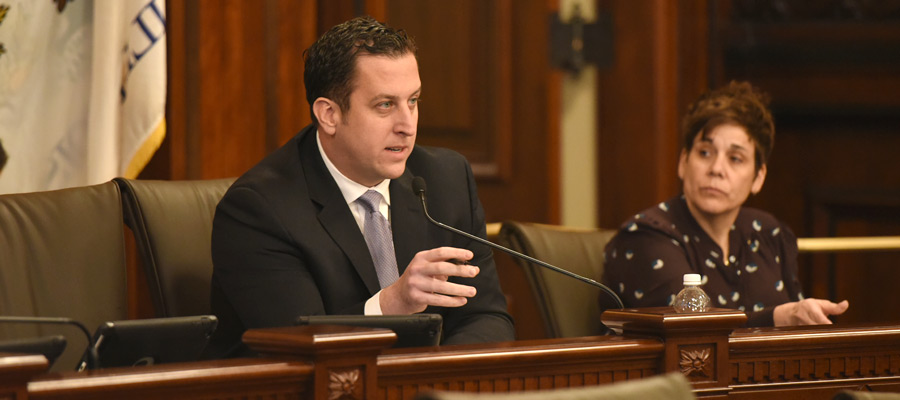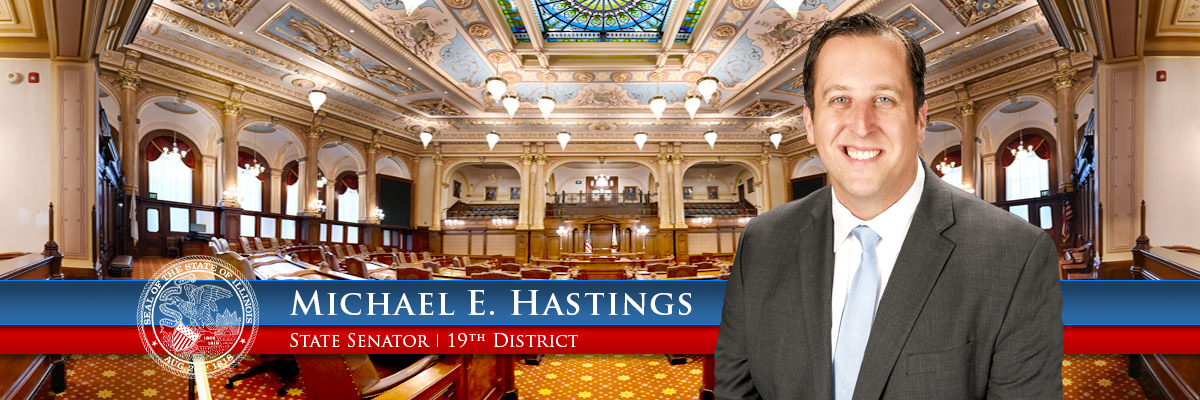- Details
- Category: Press Releases

TINLEY PARK – The state of Illinois now has a procedure in place to alert emergency professionals of missing disabled persons, thanks to State Senator Michael E. Hastings (D -Tinley Park).
Hastings’ Senate Bill 2265, which was signed into law Wednesday, is aimed at reporting, quickly locating and returning missing disabled persons to their homes.
It is motivated by the story disabled man who wandered away from his group in Matteson, Illinois during a group-home outing. When caretakers requested an Amber alert for the man, the authorities said there was no system in place for individuals living with disabilities.
After 21 hours, the man was returned to his caretakers and the incident left advocates wondering if more could be done to protect Illinois’ disabled populations. Hastings worked with the advocates to draft the new law.
“This new commonsense procedure will help us protect individuals living with intellectual and physical disabilities,” Hastings said. “This small change will immediately alert authorities and emergency networkers to bring our loved ones home.”
These individuals will be covered under the Endangered Missing Person Advisory Program, which will provide a regional system for the rapid dissemination of information of missing people.
“If this alert system had been in place, it would not have taken 21 hours to locate that man in Matteson,” Hastings said. “With this law we are giving authorities the tools to effectively disseminate missing persons reports.”
Senate Bill 2265 became law thanks to bipartisan support and will take effect on Jan. 1, 2019.
- Details
- Category: Press Releases
 TINLEY PARK – Gov. Bruce Rauner put the personal information of all Illinois voters at risk on Tuesday by vetoing a measure which would have ended the state’s participation in a controversial, unsecure voter registration system.
TINLEY PARK – Gov. Bruce Rauner put the personal information of all Illinois voters at risk on Tuesday by vetoing a measure which would have ended the state’s participation in a controversial, unsecure voter registration system.
Rauner vetoed Senate Bill 2273 which would prohibit the Illinois State Board of Elections from sharing any voter information with the controversial Crosscheck system or any other interstate voter registration program other than the mandated Electronic Registration Information Center (ERIC).
State Senator Micheal E. Hastings (D-Tinley Park) is outraged at the governor's veto.
“Illinois residents deserve to have the peace of mind that the Illinois State Board of Elections is taking every necessary precaution to protect their sensitive personal information,”Hastings said. “Honest elections are the bedrock of our democracy. I wish Gov. Rauner felt the same.”
Rauner’s veto comes in light of Friday’s news that Russian intelligence officers were charged with hacking into the email servers of the Democratic Party and the Clinton campaign. Illinois state officials said, based on a reference in the indictment, it is likely they also stole voter data from Illinois.
"It's our duty to protect voters' personal and sensitive information and promote impartial and honest elections," Hastings said. “Elections are a sacred component of our democratic process. It is plain and simple – Illinois voters should not have to fear their identity will be stolen if they decide to register to vote. I can’t believe this is up for debate.”
Hastings, who is Chairman of the Illinois Senate's sub-Committee on Cybersecurity, has continued to investigate the 2016 State Board of Election security breach. He said it is important to withdraw from Crosscheck not only for security concerns but also because the program could be used to suppress the minority vote.
"It is clear that Crosscheck is an inferior program that endangers the personal data of all Illinoisans and makes it vulnerable to hackers,” Hastings said. “I don’t understand why Gov.Rauner is open to compromising Illinois’ citizen’s social security numbers, date of birth and other vital information.”
Illinois began using Crosscheck in 2010 when no other alternatives existed. Since then, ERIC has been developed by states concerned over the security of the personal information shared with other programs.
- Details
- Category: Press Releases
ORLAND HILLS — To honor local veterans State Senator Michael E. Hastings is partnering with Orland Hills Mayor Kyle Hastings to host a free Veterans Breakfast from 9 to 11 a.m. Saturday, June 23 at the Orland Hills Recreation Center (16553 Haven Avenue, Orland Hills).

- Details
- Category: Press Releases
 TINLEY PARK – Credit reporting agencies will no longer allow consumer reporting agencies to impose a charge on a consumer for placing a freeze, removing a freeze, or temporarily lifting a freeze on their credit reports, thanks to a new law championed by State Senator Michael E. Hastings (D-Tinley Park).
TINLEY PARK – Credit reporting agencies will no longer allow consumer reporting agencies to impose a charge on a consumer for placing a freeze, removing a freeze, or temporarily lifting a freeze on their credit reports, thanks to a new law championed by State Senator Michael E. Hastings (D-Tinley Park).
Hastings pushed for safeguards after Equifax announced that a security breach compromised the personal information of 143 million U.S. residents, including more than 5.4 million Illinois residents.
Equifax originally disclosed the breach in September of 2017, but since then, there have been multiple disclosures from the company that show more vital information was stolen than the company originally revealed. Just last month, Equifax informed the public that a small number of passport images and information were stolen as part of the security breach, despite previously denying such a thing occurred.
“More than 5.4 million Illinois residents do not know who may have access to their personal information and what they might do with it,” Hastings said. “This new law will allow consumers to protect themselves in a cost-effective and timely manner.”
In the original report released to the U.S. Senate Banking Committee, Equifax admitted that the security breach compromised information such as names, Social Security numbers, birth dates, addresses and driver's license numbers. This breach is very concerning, as such sensitive information can be used for identity theft and fraud.
House Bill 4095 will prohibit credit reporting agencies from imposing a charge on a consumer for placing a freeze, removing a freeze, or temporarily lifting a freeze on their credit reports.
Previously, consumer reporting agencies were allowed to charge up to $10 each time a consumer wished to take these proactive actions.
House Bill 4095 will not only eliminate fees but would also allow Illinois residents to initiate or remove a freeze by telephone and through electronic methods.
“This commonsense law is long overdue,” Hastings said. “We live in a global economy. Modern business structures require large and small companies to provide online services to store a consumer’s personal and sensitive data. Our information is stored in clouds and databases regardless of our approval. This makes it easier for dangerous individuals to hack and distribute this information to bad actors. This new law will ensure there are safeguards in place to protect Illinois citizens when misfortune strikes.”
House Bill 4095 goes into effect immediately.
More Articles …
Page 50 of 87


